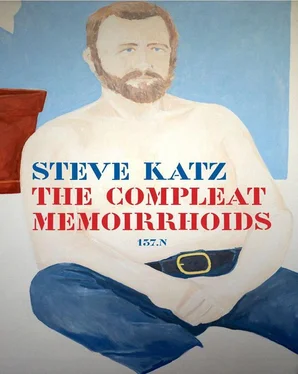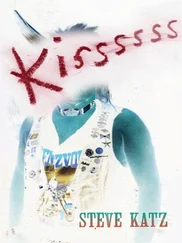Through some union connections my uncle Duke gets me a job in New York waiting tables at Longchamps, a chain of somewhat upscale restaurants. I work at the one on Fifty-eighth and Madison with a wait-staff of old pros. One of them in his fifties, who wears a cheap black wig that often slips and bunches above his ear, sees that I am having some discomfort and offers sage advice. “Sonny boy,” he says. “This is a tough store. You got to climb those stairs from the kitchen. Trays get heavier as the shift gets later. I can see you sweat a lot; I mean, probably down there too you sweat right in the crack. Don’t get me wrong. It starts to burn. I know what it’s like. What you do is take a small ball of cotton and put it right there, right in the sphincter, to soak up the sweat. You’ll feel one hundred percent better. You’ll be nicer to your customers. It’s about the tips. That’s my advice to you.” No doctor has ever advised me better.
Jan Mitchell notices me. He’s a sleek, slim beached blonde. He owns Longchamps, and also Luchows, the famous celebrity restaurant on 14th Street. He’s gay, and discretely lecherous. Definitely he sets his sights on me and one evening suggests there might be an opening at Luchow’s. My family used to talk about that restaurant as if to eat there was to ascend Mount Olympus. Waiters make $300 to $400 a night in tips. Dollars are big at this time. Even the busboys come away with $250 or more. Work a few months there and I can buy the Morandis and head for The Tribute Money as well. The older waiters warn me about Mitchell’s motives. I finally lose my nerve, not because I’m afraid of those motives, but because of a failure, a lapse in my waiting skills.
I am assigned to run the late night café at the 58th Street Longchamps store. It stays open until 3 A.M. I love the hours. I love Manhattan in those hours before dawn. You can hear its pulse. I walk into the quiet streets after three, into the rain, into the hours of street sweepers and garbage trucks, a few late workers trudging home, some early workers yawning into their jobs. The pigeons coo on their ledges. I love to stop at some all night bar on 57th Street before going home. You never know who’ll be singing at the piano bar — Little Jimmy Smith, Esther Phillips, even Carmen McCrae. Someone always loves to sing for free, to sing till dawn.
I run this café myself. There is only one small Polish cook in the kitchen on this shift. He speaks little English. I handle everything well, proud of my service, until one morning after 2 A.M. Jack Paar comes in with a woman, one of his perennial guests, fresh from the Tonight Show. Their smiles are wide as a two-car garage. Here is my chance to be noticed by Jack Paar, I think. I have no idea what that will do for me. They order crepes. I dreaded that someone might order crepes. The crepes are a ritual, made at the table, with a bit of flourish. I never made them. I haven’t yet ever eaten crepes. Nobody briefed me on how to make them. I know where the crepe cart is. I think I know where the batter is cooling. I always expected that if there were an order I could find someone to do it, watch him at least the first time, and then I might learn. The cook shrugs his shoulders in Polish. I don’t know what to do. I light the flame under the shallow-domed crepe griddle, but then I freeze up. I have no idea what comes next. The place is empty, just me and Paar and Dagmar, whoever she is, the broad blonde that sits with him. I have totally lost my nerve. Time crawls towards 3. Paar and friend finally realize they will never get their crepes. They get up to leave and aren’t even angry. They leave me a small tip. What great New Yorkers. What I have done is what I haven’t done. How can such a wimpy waiter ever measure up to Luchows?
I bring in a poem I have written for Roy Lichtenstein to show the gallery owner. I explain my dilemma about the Morandis or travel. “You should show this to Roy. He’d love it.” That he is on a first name basis with the artist makes me tremble. I have become such a yokel living out of the city. That I can actually show the poem to someone I think of as an icon of contemporary art makes me almost sick. I never do it, alas. I ask the owner what he thinks about my dilemma. He says he knows which he would choose. I tell him I’m choosing to travel. For me seeing the Masaccio is huge. “So you’re setting out to have a wonderful life in the arts, of writing, of travel.” He straightens his knit tie, a slim, grey-haired man in an elegant dark blue silk suit. He probably occasionally eats at Luchows. He sounds almost jealous, jealous of my youth and freedom. I don’t tell him I have two kids and a pregnant wife. I enjoy my Byronesque moment.
Travel is what I choose, eventually hauling Jingle, seven months pregnant, and Avrum and Nikolai, to Italy after me. I never regret it. We have three great years, one in Lecce and then two in Verona. Rafael is born in Lecce. I have contrary thoughts much later, only when I see my two paintings at a Morandi retrospective at the Tate in London, and then again at The Guggenheim. I mumble to myself, I could have had those for $1100.
When the Christian missionaries arrived en masse, Nicholas, the owner of the Mont Joli hotel, asked me to move me to the hotel’s cottage, just over the hill. It was spacious and luxurious, he told me. It was a perfect place to write. I would like it. Bip had arranged the accommodations, so it wasn’t on my dollar, and I didn’t feel I could object much; besides, I was curious about the cottage. Two college age girl missionaries, one rotund and lively, the other shapely and pretty, sat on the terrace checking out the young Haitian guys who worked around the pool. I was also curious to see how that might evolve. My new digs were over the hill through absolute darkness at night that was for me, new to Haiti, a bit scary.
The cottage was about 40 yards back from the water, and down the trail from a promontory that held a chateau half finished or half ruined they claimed was built for Napoleon’s mistress. I ate in the hotel dining room, where I could see that each of the young missionary women had selected her personal juicy Haitian boy to play with. To express his regret for having to displace me Nicholas took me on a jaunt in his jeep with a young Canadian couple into the jungle, onto a palm shaded peninsula he owned. It jutted into the Caribbean. This was glorious. I felt some guilt for not sticking to my writing schedule, but then I thought, “What the hell. Take a day off. This is Caribbean romance.” The unromantic aspect was that I was alone. The Canadian newlyweds disappeared behind a dune. Nicholas, who looked as much like a West Coast surfer as a Cape Haitïen hotel owner, explained that he wanted to develop time-share condos on this site. I thought, what a horrible idea. He shouted and waved at what looked like a village across the cove, and we heard someone shout back. Soon two men from the village paddled towards us in a dugout canoe. This was too exotic. This was like totally faux Africa. I was being paid to write a script. This was almost Hollywood. One of the men dove into the emerald water off the canoe brandishing a spear. He swam beneath the canoe, surfacing to breathe, then diving again, and again, finally spearing a big fish. According to Nicholas’s instructions the fishermen built a fire, let it burn down, and placed the fish, wrapped in banana leaves, on the coals. Nicholas left. With gestures the fishermen instructed me to turn the fish over at a certain point, then they paddled away.
I retreated to a palm tree. I hadn’t worn a hat nor brought sunglasses, so the sun was fixed on bake me as the embers bake the fish. The couple emerged from the dunes and looked at the fish cooking, then looked at me probably wondering what I was doing there alone. They said nothing, were flushed and rumpled from lovemaking and weren’t interested in eating fish. They disappeared again, in another direction, back into the dunes. I sat through the afternoon and picked at white flecks of what was maybe a snapper. I thought, “This is a tropical paradise. I am having an unbelievably romantic adventure. I am having it alone. It makes me really lonesome. I wish I was back writing, or reading in the cottage.” Occasionally I heard squeals from the couple coupling. Now and then the breeze wafted a thick scent of tropical bloom, limey and sweet, to penetrate my mood. It made me nauseous. I picked at the fish and was anxious for Nicholas to return and take me back. This paradise blanketed with condos? Yes, a few jobs, but my nausea redoubled at the thought.
Читать дальше












